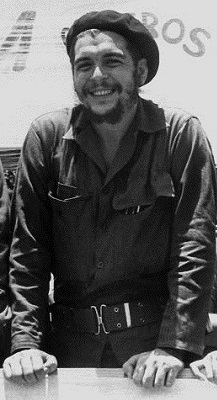|
~ Ernesto Che Guevara
~ Galéria
~ Oldal
~ Bejelentkezés
~ Vissza a Főoldalra
Ernesto Che Guevara, az argentin származású forradalmár, miniszter, gerillavezér és író, Buenos Aires-ben szerzett orvosi diplomát, majd a kubai forradalom során jelentős szerepet játszott a szigetország felszabadításában és újjáépítésében. A kubai gazdaság talpraállításáért dolgozott, küzdött az oktatás és az egészségügy fejlesztéséért, az írástudatlanság és a faji előítéletek felszámolásáért. Saját példájával népszerűsítette az önkéntes munkát. Kongóban és Bolíviában is harcolt - harminckilenc éves volt, amikor az amerikai-bolíviai csapatok csapdába ejtették és kivégezték.
| | |
|

| | |
|
|
|
Che Guevara irodalom | Che Guevara literature
|
Délelőtt egy kicsit kibővítettem a Che Guevara-ról szóló, alapvető olvasmányokat tartalmazó részt, valamint egy újabb könyvet csatoltam hozzá, az egykori munkatárs, Orlando Borrega által írt Che - El Camino del Fuego című művet.
(Eredeti nyelven - spanyolul - ingyen letölthető az Idézetek és beszédek című modulban, magyar nyelven eddig még nem jelent meg - és valószínűleg nem is fog, tekintve, hogy Che nem egy keresett (vagy népszerű) téma az országunkban és a lefordított, korábban megjelent könyveit vagy a róla szóló műveket is szinte lehetetetlen beszerezni).
[elolvasom]
|
|
In the morning I have worked on the module containing the list of the essential books about Che Guevara.
All of them were given a short review containing my opinion (if I have read them before) and I have added a new one: Che - El Camino del Fuego, written by Orlando Borrego who was Che's colleague in the Ministry of Industry. (The book can be downloaded free in the original Spanish language from the module titled Quotes and speeches).
[check it out]
|
|
|


| | |
|
|
|
~ Ernesto Che Guevara
~ Gallery
~ Site
~ Log in
~ Back to the Main page
Ernesto Che Guevara, the Argentine-born revolutionary, minister, guerrilla leader and writer, received his medical degree in Buenos Aires, then played an essential part in the Cuban Revolution in liberating and rebuilding the country. He did his best to set up the Cuban economy, fought for the improvement of the education and the health system, the elimination of illiteracy and racial prejudice. He promoted voluntary work by his own example. He fought in the Congo and in Bolivia - he was thirty-nine years old, when he was trapped and executed by the joint American-Bolivian forces.
| | |
|
|

